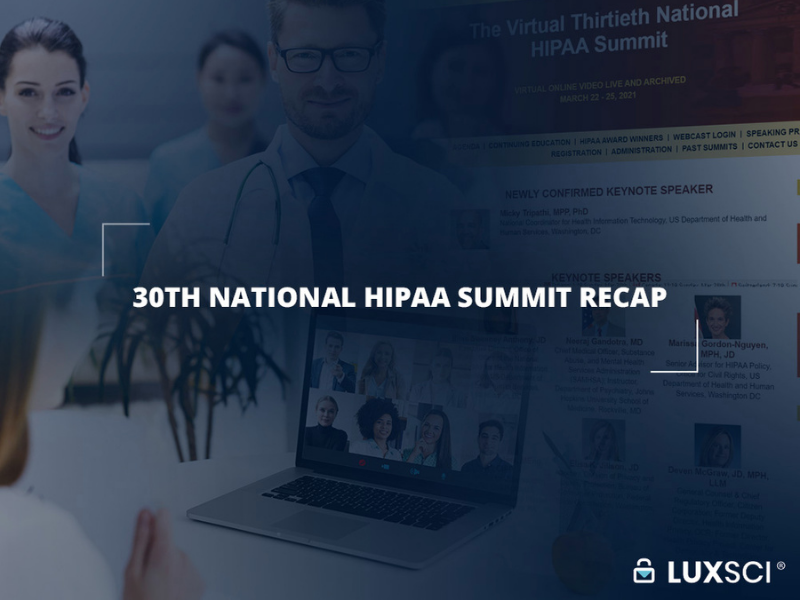30th National HIPAA Summit Recap
Tuesday, March 30th, 2021Last week, the LuxSci team attended the Virtual 30th National HIPAA Summit. The conference featured government and industry leaders who led sessions on updates to HIPAA rules, ongoing threats to cybersecurity, the impacts of remote work, and many other topics.
We can’t touch on every session that took place over the four days of the conference, but some of the most interesting updates came from the Office of Civil Rights (OCR) at Department of Health and Human Services. OCR is responsible for enforcing HIPAA, so as you would expect their sessions were of high interest to anyone responsible for compliance.
OCR UPDATES
At the start of the pandemic, OCR adopted enforcement discretion to allow health care organizations to quickly transition to virtual health care and remote work without fear of penalties. In January, OCR announced that enforcement discretion would also apply to Covid-19 vaccine scheduling. OCR will not impose penalties on those acting in “good faith” to create online or web-based scheduling applications for Covid-19 vaccine appointments. Nevertheless, this does not mean that covered entities are off the hook when it comes to HIPAA. It is recommended that they implement “reasonable safeguards” to protect PHI.
The Office of Civil Rights has also continued to penalize organizations for right of access violations. When most people think of HIPAA, they think of protecting private information through strict security policies. However, HIPAA stands for the Health Insurance Portability and Accountability Act. Portability means that patients have a right to access and transmit their information to other insurance or health care providers as they see fit. In recent years, OCR has increasingly penalized organizations for failing to respond to patient information requests in a timely manner. It is important for health care organizations to have secure offsite back-ups of patient information to prevent enforcement actions. It is challenging to find the right balance of security and patient access, but it is so important!
CYBERSECURITY THREATS
Unsurprisingly, Covid-19 exposed organizations to new security risks as employees rapidly transitioned to remote work. Although the pandemic changed practically every aspect of our lives, phishing and ransomware remained two of the biggest security threats to health care providers. At the outset of the pandemic, many ransomware hackers voluntarily stopped targeting hospitals systems in a show of solidarity. However, the respite was temporary. As the value of health care data on the black market has continued to rise, ransomware attacks have surged.
Phishing also remains a primary attack vector for intruders. OCR reported that in the first two months of 2021, hacking/IT accounted for 71% of large health care breaches. According to OCR, most large breaches have occurred via email (39%) or network servers (32%). Phishing attacks increased so much over the last year that one conference speaker noted his organization considered turning off external emails. Though it is true that the only way to completely avoid hackers is to disable your systems, it is an unrealistic option for most businesses. To combat phishing, organizations need to train staff and have technology controls in place to prevent human error. If you have the right email filtering in place, you can prevent phishing emails from even reaching your employees’ inboxes.
REMOTE WORK- LEARNING FROM THE PANDEMIC
Shifting to remote work in early 2020 left organizations scrambling to create security policies and protect patient information. Not only did providers need to worry about preventing telehealth conversations from being overheard by their families, but they also needed to be conscious of a wide array of security issues including:
- Securing their physical workspace and devices
- Preventing data loss
- Protecting notes from patient conversations
- Using secure network connections
- Letting children or partners use work devices
The number of security risks that remote work introduced were almost immeasurable. Organizations needed to act quickly to create new policies to protect patient data, while maintaining excellent standards of patient care. Time and time again, health care organizations that lacked basic cyber hygiene like unique logins, complex passwords, and device usage policies were the most at risk of a cyberattack or breach.
One year later, organizations are continuing to adapt their policies as much of the workforce remains remote. Many presenters expect at least some of their workforce to remain remote once the pandemic ends. Some organizations were surprised to discover the benefits of having a remote workforce. Rural hospitals are better able to attract talent when remote work is an option. Patients also benefitted from increased access to health care when telehealth was an option.
The HIPAA Summit was a wonderful reminder that if you don’t have procedures and policies in place to protect your patient data and communications, it’s only a matter of time before a breach occurs. Did you attend the HIPAA Summit? We would love to learn more about your challenges with Covid-19 and secure patient communications.






